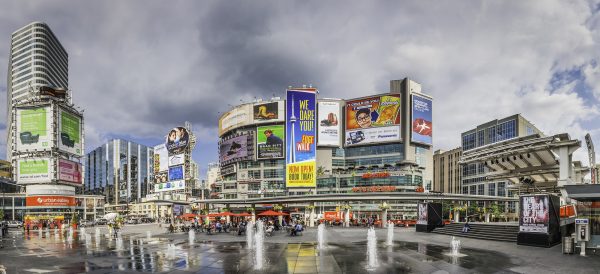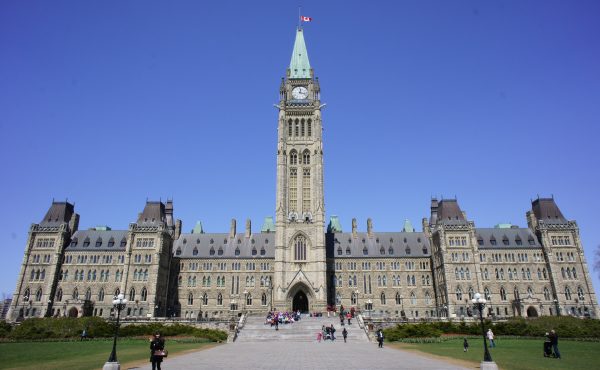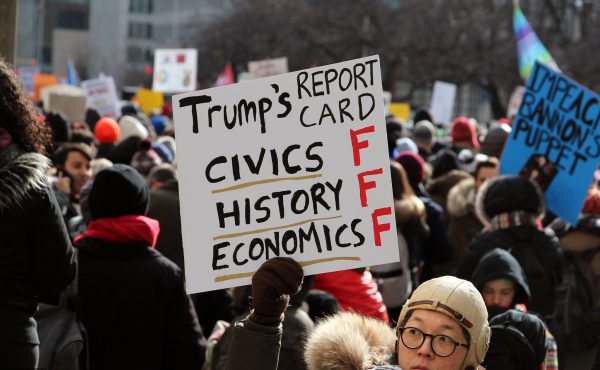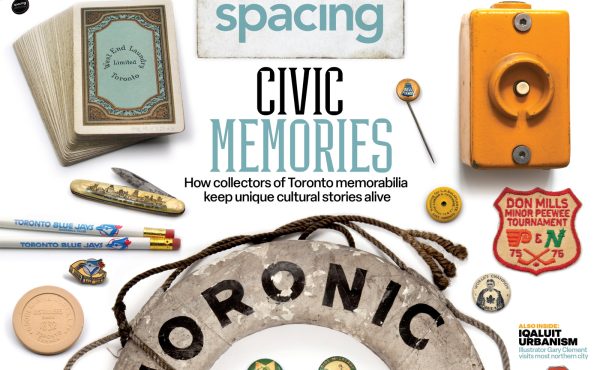It’s not often that I strenuously disagree with Spacing editor Dylan Reid, but when I read “To Rename Yonge-Dundas Square, Let’s Follow the Process,” I felt a visceral need to offer a countervailing view. I agree that a commitment to consultation was part of Mayor Olivia Chow’s brand during her election campaign. After an advisory committee of 20 people picked a shortlist of four possible names, the recommendation was that Torontonians would be the ultimate decision makers.
Yes, there were several Black people whose names were discussed in relation to the square, including John M. Tinsley, Chloe Cooley, and Lucie and Thornton Blackburn (Reid’s preference), due to their connection to slavery and their positive contributions to the city’s history, especially in light of Henry Dundas’ role in slavery, as outlined in this article by Melanie Newton, associate professor of history at the University of Toronto and co-chair of the renaming advisory committee.
Furthermore, the naming of the square hasn’t just caused public debate; it’s also resulted in resignations. According to the Toronto Star’s reporting, Mike Fenton, manager of Yonge-Dundas Square, is stepping down over city council’s vote to rename the downtown landmark due to the lack of public consultation.
The question I am grappling with is how do we define the “public” and “consultation”? On the one hand, this process started three years ago through a consultation exercise which was shared publicly. On the other hand, after many individuals weighed in, publicly elected officials made a decision. Does that not make the name choice public.
If we are to step back and look at this situation from the point of view of re-naming a public space, it is so much more significant than selecting a single person whose name will be enshrined on the square, or even allowing the public to weigh in on a name.
What I am concerned about is the need to name public spaces after individuals. There are numerous other Black Torontonians who were (are) not considered, but who have played just as significant a role in Toronto’s history and geographies of space and place, especially in the Yonge-Dundas area. I’m thinking, for instance, of Jackie Shane, a Black, transwoman from the American South who, in the 1960s, performed at the clubs in the vicinity, such as Le Coq D’Or Tavern, at 333 Yonge Street (between Gould and Dundas Streets, on the east side). Not only does “Jackie Shane Square” have a nice ring to it, but this choice would place a Black person who broke barriers and contributed to the area’s recent cultural history into conversations about Black lives, queer lives, and the need to make welcoming space for everyone.
My point is that there are so many historical figures who have been forgotten that to even narrow the list of potential candidates to a few seems quite unfair.
In the 21st century, it’s time we stop naming public spaces, buildings, universities, or sports facilities after individuals. As someone who was on the re-naming committee for Toronto Metropolitan University, I recall the mixed opinions on the final choice. However, the ultimate goal was for a new name that was removed from any person or past that was connected to the pain and suffering of Black and Indigenous peoples.
I was disappointed when council voted to name a football stadium in Etobicoke after former mayor Rob Ford, not because I have any animus toward him, but because too many of our decisions related to commemoration are rooted in the exultation of individuals rather than aspirational qualities to which everyone can universally relate.
Nearly a decade ago, I penned an article for Rabble.ca that made a case for rethinking Black History Month. In it, I argued that re-naming has been a part of the Black experience since the first enslavers brought Africans onto the shores of what is now North America in the 17th century. We were forced to adopt their names in an attempt to remove us from our African lineages. In this context, we adapted to new names, finding ways to retain our past (through language, food, music, dance, art, etc.) while somehow embracing an unknown future.
This tension between past, present-and future is what has sustained Black people through multi-generational trauma. We are often seeking ways to make sense of the past, to live in the present, and to imagine a new future. That’s what “Sankofa” symbolizes. It asks us to take from the past what is good and bring it into the present in order to make positive progress through the sharing of knowledge. As someone who has gone through significant challenges over the last few years, this name is one that I can relate to, and I’m sure once people get over the newness of it, they will feel the same.
Ultimately, what I am hoping for is that we learn the lessons from the past, and begin to think of names that call upon our higher selves, not keep us bound — albeit symbolically — to people, and, most importantly, to the slave narrative, no matter how triumphant or inspiring the individuals who overcame it were.
We have an opportunity with “Sankofa” to bring ancestral Black knowledges into the present in ways that dislodge sentiment, nostalgia, and myth-making. For this reason, I support the name of Sankofa Square, and consider the ongoing discussions about what the name means as the public’s consultation.
Cheryl Thompson is an Associate Professor in Performance at The Creative School, Toronto Metropolitan University. Her latest book Uncle: Race, Nostalgia and the Politics of Loyalty was published in 2021. Follow Cheryl on X at @DrCherylT.
photo courtesy of iStock: 533418989





15 comments
Ms Thompson is correct that naming a place after a person is problematic. But there is little defence for the City ram-rodding this poor choice of name. With all due respect to Ghanans, it means nothing to the city. We could use loads of other words to fit the meaning it has: Harmony, Respect, Optimism…
I do like the choice of Sankofa.
We’ll learn from this.
+1 for Manda’s point.
This is a place and as such deserves to be named in context of the place and it’s history. Are we saying that our indigenous hosts never had a name for this place or area?
If not, then let’s work in the contemporary context and just call it Billboard Visual Pollution Square, or Billboard McBillboard Face.
Naming it after anyone is not the answer. And why is a Ghanian word being considered. Is there not something using what would have been a local Indigenous language that would be more suitable and appropriate? Surely we can do better than Sankofa.
Fact Check: Mike Fenton was the volunteer Chair of the YDS Board of Management – a civic appointee NOT the manager.
The concept that Sankofa represents matters a lot right now.
Especially now.
No public place should be named after anyone. Rewriting history is full of problems since it looks at things from today’s point of view disregarding 100-200 years of history.
Period. End of discussion.
Changing the names period is a problem. They are just words, and nobody should care that much about Henry Dundas. He also did push to have slavery abolished, just suggested at a gradual pace, which back then worked VS trying to stop it immediately. Furthermore, Sankofa is a word used by a tribe (the Akan) that had a huge hand and part in the African slave trade (which members have come out and admitted) . So if your “woke goals” are to remove a history regarding slavery, but rename it with a word from a tribe that participated/perpetuated slavery it makes absolutely no sense. It is also a huge waste of money, 12+mil to rename things is stupid. We have bigger things to worry about than renaming Dundas…..
Please step back and consider a name that pays tribute to thhe First Nation’s heritage. And please stop the expensive Dundas renaming initiative. If this present city government wants to leave a legacy, be the government that invested the money in providing humane shelter for the every increasing numbers of the homeless and destitute.
I just don’t understand how they could decide to rename any city-owned space anything that doesn’t acknowledge our Indigenous heritage. Every city function opens with a long and meaningless land acknowledgment yet when an opportunity arises to do something more meaningful, they bottle it and choose a name with no connection. Any name that isn’t indigenous is a settler name.
I cannot believe all this nonsense. There are more important issues to be concerned about
With all the BS that is going on we should name it “Malarkey Square.” Or “No Name Square” Virtually no one will use “Sankofa Square” it is a completely irrelevant name to this area, we are not in Ghana. Surely there is a First Nations word or name that would be far more suitable and appropriate. Maybe we save the cost to taxpayers and sell naming rights to TMU or another local institution. After all it is a mostly billboards and advertising anyhow.
So! Which African word are you going to use?. Africa is an continent.
George Floyd square would be fitting with the times, to commemorate a great black hero who embodies so much about the black community and our history.
Simply call it “Ugly, Tacky, Failure Square”. I’m sure that Ghanians are loathe to be associated with that mess.